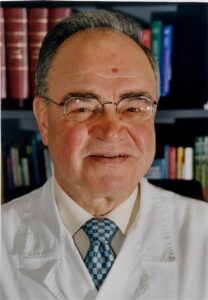I’m an old clinician; I graduated in Medicine in 1963 at the University of Padova, Italy, and I’m proud to be on the editorial board of touchNEUROLOGY. With this in mind, I would like to express my opinions on the impact of AI (artificial intelligence) in the field of neurology.
Following my graduation, I did a 3-year period of learning and foundation at Columbia University, NY, USA under the guidance of Dr Abel Lajtha, one of the founders of neurochemistry. I researched the permeability of cellular membranes in the brain in normal and pathological conditions. During my academic and professional life, including my duties at the World Federation of Neurology, I have had the opportunity, and the luck, to establish good and enduring friendships with many outstanding personalities in neurosciences (and I quote only some), including Drs Melvin Yahr, Lewis Rowland, Franz Gerstenbrand, Arvid Carlsson, Hirotaro Narabayashi, and many others. From my experiences with all of them, both my human and scientific selves have been enriched, with , – the main principal remaining from all of my work that the patient has to always be at the centre of our activities. This was the core philosophy and teaching of all the above mentioned “Maestri”.
At the time of my clinical formation, there were few of the current technological supports, and the approach to the patient was predominately clinical, with a deep and complete anamnesis and objective neurological examination. The sole technological supports were plain X-ray, electroencephalogram (EEG), and cerebrospinal fluid (CSF) analysis. The other very important factor in our work was an empathic relationship with the patient and their relatives. We should recall that in those years, there were no intensive care units, and in neurology there was no knowledge of the aetiology or therapies of diseases. The field was fascinating, not only for the mystery of the brain, but even for the diagnostic approach, done exclusively on the basis of clinical examination.
However, at the end of the 1960’s and the beginning of the 1970’s, something happened, a true revolution – I’m referring to the Dopa discovery, with all the exceptional consequences, and to the explosion of technological support, especially in the imaging field, with computed tomography (CT), nuclear magnetic resonance (NMR), positron emission tomography (PET), single-photon emission computed tomography (SPECT), etc. Now, we have seen the progression of these two revolutions, and we are all quite happy for the many positive results that we had acquired for the good of our patients in terms of better and faster diagnostic procedures, but also better therapeutic approaches, rehabilitation, and some preventive measures. Many problems remain to be solved and clarified for a number of diseases, but we are certainly on the right road, so we should be somewhat optimistic for the future. Naturally, everyone will understand that the reflections above are quite brief and may seem superficial, but this was necessary for the context.
Now, in this context, it should be clear that my opinion on what we can expect with the introduction of AI into our field would be coherent with my history. I will try to be brief and clear with two answers: 1) I think that AI will certainly give benefits and progress in health services organisation and in all technological approaches in neurological diseases; and 2) nothing will be given by AI, and in my opinion the use of it should be avoided, in the “personal” relation between the physician and the patient – that is and should stay “unique” and cannot be substituted by any kind of technological device, and we should remain faithful to the Hippocratic philosophy. Of course, we should always keep in mind the need to balance technology with our humanity, and above all, to keep the patient and the human at the core of our work.
Disclosures: No fees or funding were associated with this short article.
Cite: Battistin L, What impact will AI have on the field of Neurology? touchNEUROLOGY, October 15, 2024.
 Prof. Leontino Battistin was born in 1939 in Fiume (now Rijeka, Croatia). He graduated in Medicine from the University of Padova, Italy in 1963 and became a neurology specialist in 1967. He was a Research Fellow at Columbia University, NY, USA from 1967 to 1970 and later a Full Professor and Director of the Department of Neurosciences at the University of Padova until 2009. He founded the IRCCS San Camillo Neurorehabilitation Hospital in Venice, serving as Scientific Director from 2005 to 2014. He has held leadership roles in multiple neurological societies, has organized international congresses and published over 300 papers, focusing on neurodegenerative diseases, cerebrovascular conditions and neurorehabilitation.
Prof. Leontino Battistin was born in 1939 in Fiume (now Rijeka, Croatia). He graduated in Medicine from the University of Padova, Italy in 1963 and became a neurology specialist in 1967. He was a Research Fellow at Columbia University, NY, USA from 1967 to 1970 and later a Full Professor and Director of the Department of Neurosciences at the University of Padova until 2009. He founded the IRCCS San Camillo Neurorehabilitation Hospital in Venice, serving as Scientific Director from 2005 to 2014. He has held leadership roles in multiple neurological societies, has organized international congresses and published over 300 papers, focusing on neurodegenerative diseases, cerebrovascular conditions and neurorehabilitation.


